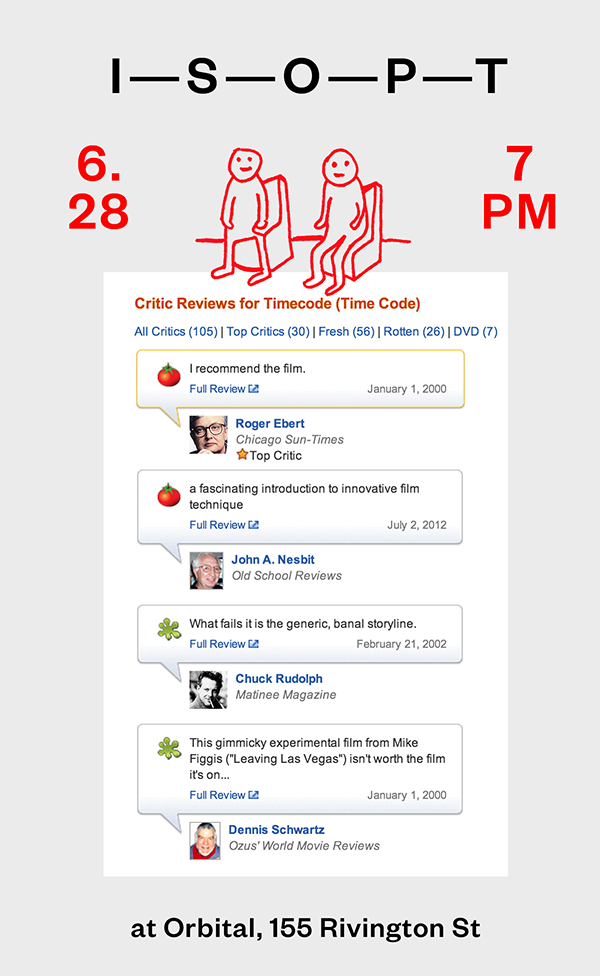Real-Time Film Club
27 Jun 2014, by Taeyoon ChoiReal-Time Film Club is a casual, sporadically held series of meet-ups meant to generate in-depth discussions around I-S-O-P-T with likeminded artists, scientists, and thinkers. At Real-Time Film Club, a screening may or may not involve watching films that present themselves as “real-time” (think Run Lola Run), and it may or may not involve mechanisms for playing with the film’s temporality. The name itself is intentionally a bit mysterious and maybe even misleading, and we hope that the screenings follow in a similarly contingent spirit.
For the first event, we will be screening director Mike Figgis’s 2000 film Time Code. We are interested in the premise of the film, its technique as material, rather than its cinematic quality.
“You are looking at a movie screen split into four parts. You will see a tale of sex and power, captured by four different cameras. You will witness a story told in real time, without any edits. You will experience the first movie ever told in four dimensions.”

More information
Real-Time Film Club meetings rely on the finite, linear temporality of specific media— such as a film or a televised sports event — and take advantage of it to explore the different feelings of temporality that can arise from a social gathering in physical space. In the first installment of Real-time Film Club, we will experiment with what exactly this could mean.
Cinema, as we all know, is a time-based medium. But cinematic time has its own character, which is always in tension with lived experience. A film will condense a day into ninety minutes; a lifetime into two hours. We’re interested in the awkward mixing and slippage of viewing time, narrative time, and filming time as a way of sparking discussions of the differences between them.
Maybe it’s this tension that has produced the novelty phenomenon of “real-time” films: movies that promise to give us “real” time — by this they usually mean uninterrupted linear time (think Run Lola Run, or 24). We want to challenge the idea that this time is exclusively “real.”
For our first experiment, we are screening a film titled Time Code. Its selection was almost accidental — we looked through a list of films that try to depict “real-time” and picked one that seemed particularly peculiar.
And peculiar it is. It turns out that it has incredibly mixed reviews. But rather than evaluate this one for its cinematic value and narrative, we are interested in what the film dreams of — what it aspires to — rather than how it fails. In Time Code, we are given four movie-length film takes following different actors — no cuts — displayed side by side simultaneously. While its story is forgettable, we are interested in its method, its mechanisms, and its desirability: what made this kind of “real-time” monitoring, simultaneity, synchrony, so appealing, at least for the director fifteen years ago? and what values does that reflect in society more generally then and now? What can it tell us about popular perceptions of time today, and where does it fall short?
We hope to answer those questions together. Ultimately, what we want from Real-Time Film Club is to create a platform for collectively engaging different senses of time. Film is a good prompt for this, simply by having a special ability to pull us out of real time and put us into a different sense of it. It’s also just nice to watch movies together.
What happens at future Real Time Film Club meetings will vary from one event to the next. The only commonality is that it makes use of real-time media (in its broadest sense, ranging from real-time broadcast soccer matches to ‘real-time’ films like Time Code).
Special thanks to Orbital for hosting us.






